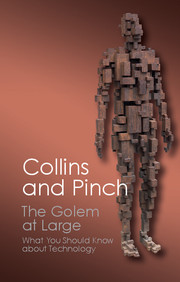Book contents
- Frontmatter
- Dedication
- Contents
- Preface and acknowledgements
- Introduction: the technological golem
- 1 A clean kill?: the role of Patriot in the Gulf War
- 2 The naked launch: assigning blame for the Challenger explosion
- 3 Crash!: nuclear fuel flasks and anti-misting kerosene on trial
- 4 The world according to Gold: disputes about the origins of oil
- 5 Tidings of comfort and joy: Seven Wise Men and the science of economics
- 6 The science of the lambs: Chernobyl and the Cumbrian sheepfarmers
- 7 ACTing UP: AIDS cures and lay expertise
- Conclusion: the golem goes to work
- References and further reading
- Index
1 - A clean kill?: the role of Patriot in the Gulf War
Published online by Cambridge University Press: 05 June 2014
- Frontmatter
- Dedication
- Contents
- Preface and acknowledgements
- Introduction: the technological golem
- 1 A clean kill?: the role of Patriot in the Gulf War
- 2 The naked launch: assigning blame for the Challenger explosion
- 3 Crash!: nuclear fuel flasks and anti-misting kerosene on trial
- 4 The world according to Gold: disputes about the origins of oil
- 5 Tidings of comfort and joy: Seven Wise Men and the science of economics
- 6 The science of the lambs: Chernobyl and the Cumbrian sheepfarmers
- 7 ACTing UP: AIDS cures and lay expertise
- Conclusion: the golem goes to work
- References and further reading
- Index
Summary
The Gulf War
In August 1990 Iraqi forces invaded Kuwait. The United States presented Iraq with an ultimatum – ‘withdraw or face a military confrontation’. The Iraqi president, Saddam Hussein, responded by threatening to stage ‘The Mother of All Battles’. Over the next four months the United States set about building up military strength in neighbouring Saudi Arabia with the intention of driving Saddam's army from Kuwait. Given Iraq's confrontational stance, this meant building a force capable of destroying all of Iraq's military resources.
Considering the scale of the imminent confrontation, and its distance from the American continent, the United States needed the backing of the United Nations and the military and political cooperation of many nations, notably Iraq's neighbours. A critical feature of this alliance was that a set of Arab states would side with the Western powers’ attack on a fellow Arab state. As the old saying goes, ‘my enemy's enemy is my friend’, and at that time all the Arab states except Egypt had an enemy in common – Israel. On the other hand, America was Israel's staunchest ally, while Iraq was viewed as an important player in the confrontation with Israel. Thus the political alignment that the US needed to hold in place was continually in danger of collapse. It was crucial for American policy in respect of the forthcoming Gulf War that Israel did not take part in the conflict. Should Israel attack Iraq, creating circumstances in which the Arab states would be directly supporting Israel in its attack on an Arab ally in the Middle East conflict, it might become impossible for the other Arab states to continue to support America. Iraq's strategy was clear: they would try to bring Israel into the confrontation that had started with their invasion of Kuwait.
- Type
- Chapter
- Information
- The Golem at LargeWhat You Should Know about Technology, pp. 9 - 39Publisher: Cambridge University PressPrint publication year: 2014



